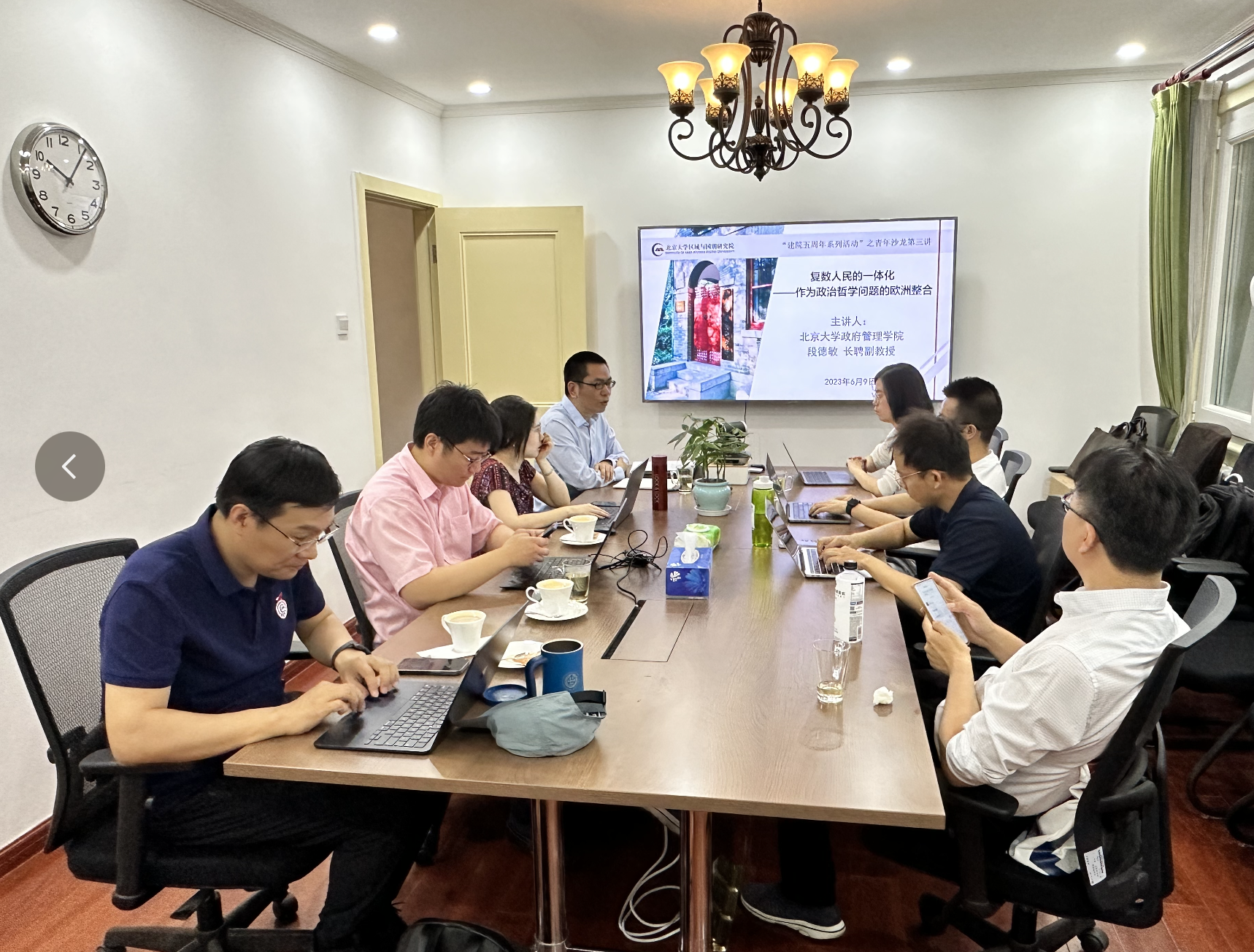
The third lecture of the Youth Salon of the Institute of Area Studies, Peking University (PKUIAS) was held on June 9. Themed “Integration of peoples in the plural—European Integration as a political philosophical question,” the salon invited Duan Demin, associate professor of the School of Government, PKU, to make the keynote speech. Zan Tao, deputy director of PKUIAS, moderated the salon. Zhang Yongle, deputy director of PKUIAS; Zhang Minyu, associate professor of PKU’s School of Foreign Languages; Chen Yifeng, associate professor of PKU’s Law School; and post-doctoral fellows of several colleges and departments participated in the discussion.
Based on his fieldwork in the EU countries, Duan Demin got into the topic by comparing the US and the EU. He pointed out that the laws, regulations and policy of a modern state to a large extent depended on the degree of its integration and identification of its people with the state, and that the integration of the states in the form of a federal system at the beginning of the independence of the US contributed to the identity of its people as “Americans.” In the EU, however, as a quasi-national entity, the people lacked an overall corresponding identity as “Europeans.”
He pointed out that the lack of a unique identity was the root for the so-called EU “democratic deficit,” which was directedly reflected in the EU’s power mechanisms. Among the three major institutions of the EU, the European Council and the European Commission, which are not directly elected, have more decision-making power than the European Parliament, which is directly elected by the European people. The European Council, which is composed of the heads of EU member states, has the power to make decisions on important EU matters, but its decision-making mainly relies on behind-the-scenes negotiations, compromises and coordination, and lacks openness and democracy. This power structure has resulted in a democratic deficit. At the same time, the European Parliament, which represents the people of Europe, suffers from three problems, which have affected its people’s willingness to identify as “Europeans”: first, the election of the European Parliament lacks a mobilization mechanism, and MEPs rely on the mobilization of political parties within the member states, which results in a weak voter base; second, MEPs are under the influence of domestic political parties, which makes them seem lacking in independence; and third, despite their transnational character, the parties in the European Parliament lack a sense of European integration in agenda setting.
Finally, Duan Demin pointed out that the problem of the democratic deficit in the EU essentially reflects the contradiction between people’s identification with their own state and their coexisting identity as a member of the unified European Union. In other words, there still exists an “identity of peoples in the plural” rather than a “complete and solid identity of the people of Europe” within Europe. This is due to the structural problems in the process of European integration, which has led to a series of crises in the EU, such as Brexit, the financial crisis and the migrant crisis.
In the discussion session, Zhang Yongle pointed out that the historical experience of Europe’s competitive and diversified development since the 19th century has constrained the current pace of European integration, and therefore calls for “rebuilding the empire” have begun to emerge within the EU, reflecting an attempt to solve the security dilemma through horizontal expansion and transformation of member states. Zhang Minyu talked about the similarities between India and the EU. He pointed out that during the colonial era, the British integrated the various forces in India by signing contracts or treaties, giving rise to an overall identity of the elite. However, in the democratization process after independence, the public, influenced by religious and caste factors, has found it difficult to form an overall identity as “Indians.” Zan Tao expressed his view that European integration was related to the decline of European civilization, and the current impulse of Europe to universalize its own ideology is a manifestation of extremism amid the decline of its civilization. Chen Yifeng mentioned the issue of Europe’s repositioning in the knowledge system. He pointed out that, with the dissolution of the universality of European knowledge from the academic, political and discourse levels, European knowledge and European experience have been gradually moving toward localization and exoticization. Finally, Chen Yifeng argued that the political discourse or political stance of Europe’s left-leaning wing represents the EU’s efforts to find a new ideological discourse and identity positioning.


